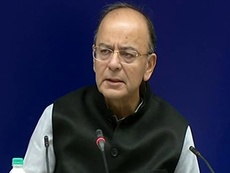Cut corporate tax rate to 20%, economists tell Jaitley
11 Dec 2017
Economists participating in a pre-budget consultation meeting convened by finance minister Arun Jaitley wanted the government to stick to its fiscal consolidation target and announce the roadmap for direct tax reforms in the forthcoming budget.
 It was suggested that the corporate tax be brought down to 20 per cent while removing all exemptions in order to make it competitive at international level.
It was suggested that the corporate tax be brought down to 20 per cent while removing all exemptions in order to make it competitive at international level.
At the same time, it was suggested that long term capital gains be taxed to bring equity and raise revenue while at the same time reducing MAT (minimum alternate tax) and announce the road map for GST, including convergence of rates, extending time for transactions' matching etc.
They also suggested incentives to labour intensive industries, including SMEs and informal and unorganised sectors, while urging the government tomake tax administration more taxpayer-friendly.
There is a need for a relook into the crop insurance scheme to make it more effective. ''It should cover not only the crop failure but also the price failure.''
The economist wanted the government to increase incentives on infrastructure investment as well as to SME and construction sectors to make them economically viable, while ensuring remunerative prices to farmers for their produce, keeping in view the target of maintaining inflation between 4-6 per cent and without compromising on macro-economic stability.
The economists wanted the government to increase its thrust on divestment of public sector units (PSUs) as it will provide extra revenue for bridging the fiscal gap and meeting the expenditure needs.
It was suggested that the government should raise age pension amount from the existing Rs200 to Rs500 and widow pension from Rs300 to minimum Rs500. It was also suggested that maternity entitlement benefits be fully implemented and be extended up to two children. Besides, the payment system for these social security schemes also need to be streamlined.
For financing long term investments in pension and infrastructure, the economists have suggested issue of long term New India Bonds. It was also suggested that a National Level Investment Promotion Body be set up to promote private investment through policy reforms and incentives.
Incentivising of non-farming activities in the rural areas will help achieve the goal of doubling of farmers' income by 2022 as this will also help in providing fruitful employment in rural areas besides raising the income of the farmers, it was suggested.
The economists said there is great potential for boosting private and public investment in defence sector.
Another suggestion was to increase wages under NREGA and take it to the level of minimum wages or even at market rates. It was suggested to set up a committee to formulate comprehensive strategy to suggest the government what should be its strategy to take the economy forward.
It was also suggested that a commission be set up to anticipate skill requirements in 21st century and suggest appropriate action for skill upgradation in order to meet the requirements of the industry and to achieve the best possible demographic dividend.
Other suggestions include betyter focus on research and development(R&D), more outlay for bank recapitalisation, including issue of recapitalisation bonds for public sector banks.
They also suggested an expansion of the Direct Benefit Transfer Scheme while avoiding pilferage, implementation of labour reforms and government support to promotion of digital payments.
Another suggestion was to follow the principal of maximising the revenue collections without looking into tax morality.
Finance and corporate affairs minister Arun Jaitley said that despite subdued global economic growth, India's growth remains impressive and one of the best in the world during the last three years. He said that India has recorded an average growth of 7.5 per cent from 2014-15 to 2016-17, significantly higher as compared to the growth in the previous two years.
In opening remarks during his 5th pre-budget consultation meeting with leading economists in New Delhi today, the finance minister said growth in the second quarter of the current financial year 2017-18 marks the reversal of the declining trend of growth witnessed in the last few quarters.
Jaitley further said that we are following the roadmap of fiscal consolidation under which the fiscal deficit as a ratio of GDP stood at 3.9 per cent in 2015-16 and 3.5 p[er cent in 2016-17 and is budgeted to be 3.2 per cent for the current financial year 2017-18.
He further said that India has been able to achieve these fiscal targets due to focus on expenditure rationalisation, plugging of loopholes in public expenditure through Direct Benefit Transfer Scheme (DBT) and the Public Financial Management System (PFMS), and by making innovative revenue raising efforts among others.



















